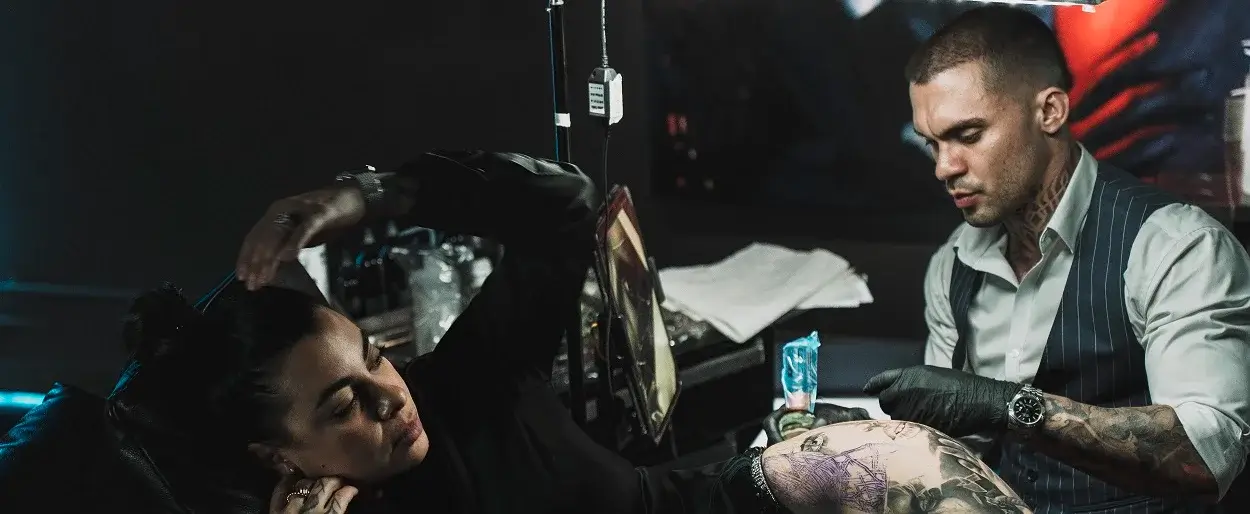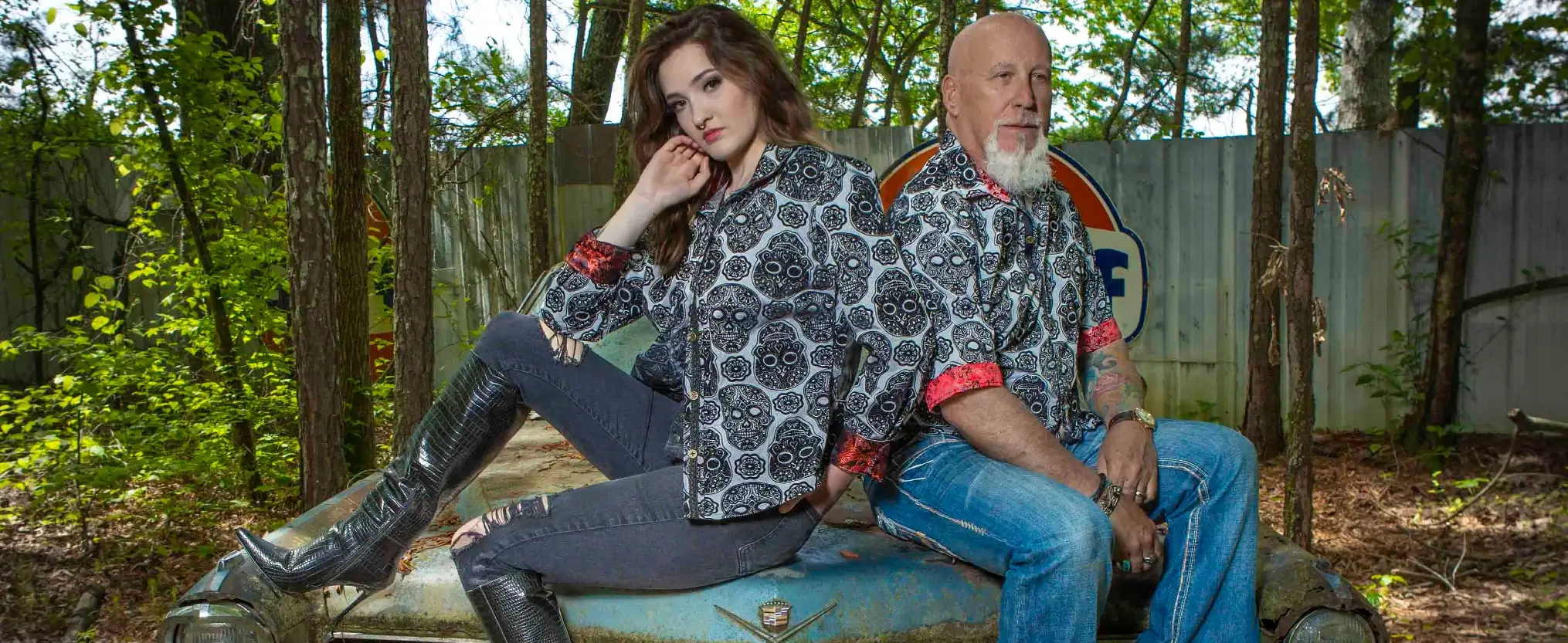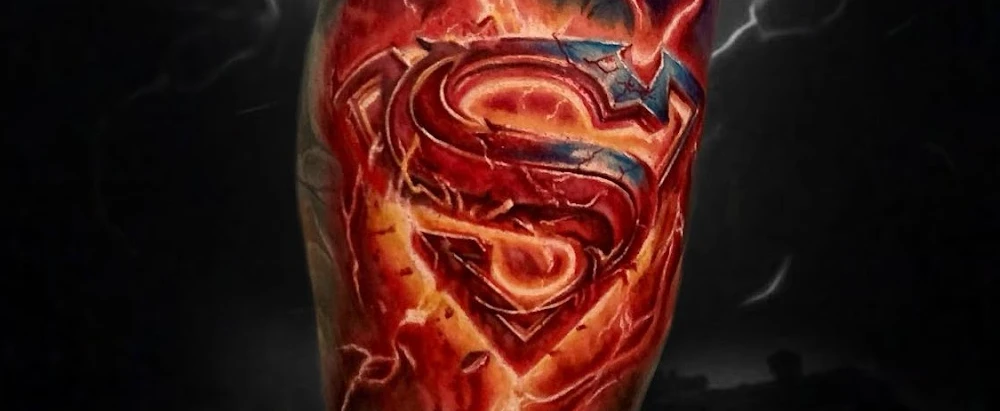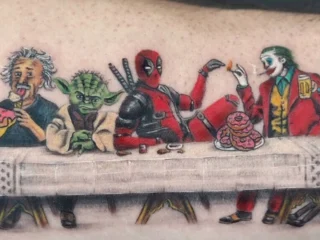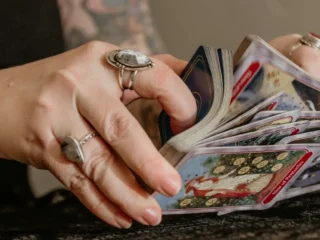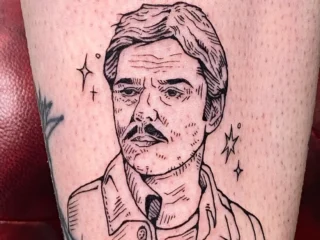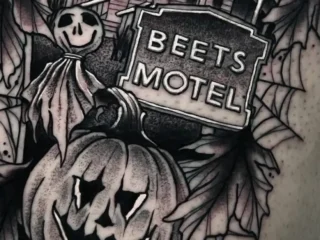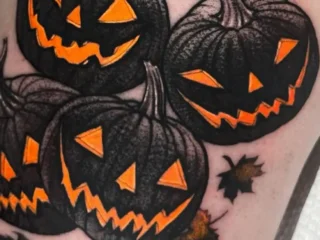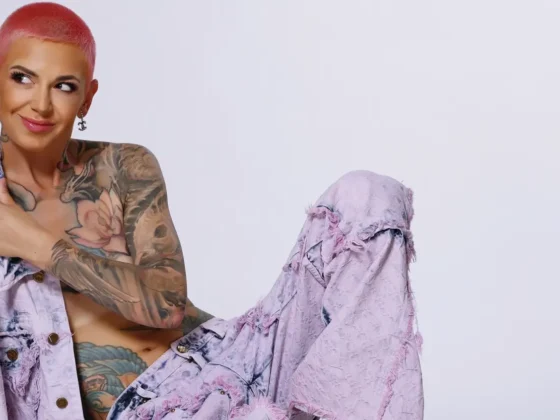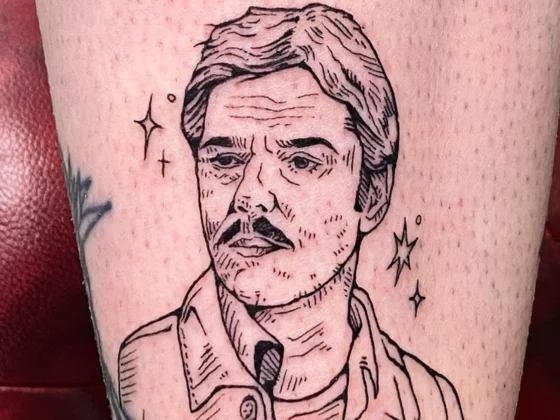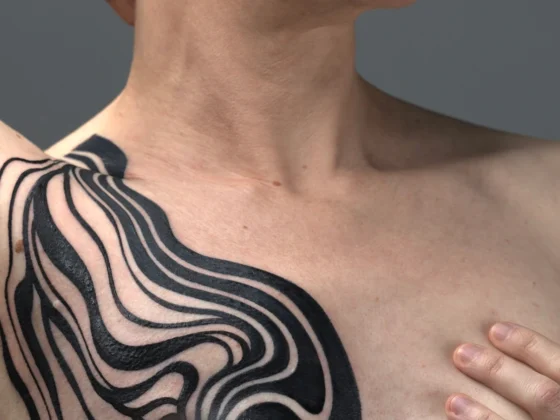Inked Mag Staff
July 5th, 2016
Meet The Tattooed Man With Cerebral Palsy That Defies All Limits
Ben Oxley is a 28-year-old badass with a taste for good tattoos and a need for adrenaline highs. He was born with Cerebral Palsy (CP), but that doesn’t stop him from…
Ben Oxley is a 28-year-old badass with a taste for good tattoos and a need for adrenaline highs. He was born with Cerebral Palsy (CP), but that doesn’t stop him from jet skiing, skydiving or getting tattooed. In fact, his condition—and Travis Barker—encouraged him to get inked. “Travis Barker got tattooed to make himself famous, to stand out because he didn’t want to get a regular job,” Oxley said to Inked during a phone call conversation. “I thought, I can do that too. I have to stand out and be seen by the world. I’m going to get tattooed.” Attention wasn’t the only thing driving the Georgia man’s desire for ink. Oxley’s CP forces him to be in a wheelchair, and he quickly realized he was being treated differently than those that were walking. “Before I got tattooed people were very apprehensive to come up to me.” His tattoos have since acted as instant ice breakers sparking dozens of conversations and allowing people to see him for who he is and not what he’s sitting in.
Oxley’s entire collection of tattoos is the work of only one artist—Jeremy Hulett, owner of Prohibition Tattoo in Dunedin, FL and also Karmic Tattoo in McDonough, GA. “I have a rule in my head that if you don’t have at least five to 10 years experience I do not let your needle touch me.” Both the client and artist have a very clever method of tattooing around Oxley’s obstacles (see question nine).
Oxley’s goals are nothing shy of ambitious; though he has had a few detours in completing his education, he is finally finishing up his GED and then heading straight to college. “I plan to study disability rights, I want to advocate on a national level,” he said. He’s already on track, speaking to student bodies at universities to encourage better programs for the disabled and make communities aware of the disabled’s potential. For immediate inspiration like you’ve never felt before, go ahead and read through our talk with Oxley to learn more about his CP, his ink and all of his unstoppable adventures. Watch him sky dive in the video above.

Tell us about your condition.
Well I have CP, it’s kind of like if you take a stereo system and a cord might be disconnected or something, one component might be working but the other part won’t be. The more tasks you give me the more confused my brain gets and so if you tell me “Pick up this pencil and write,” I can’t write. I can scribble but my muscles don’t allow me to move my hands well enough to make letters. I have to use special utensils to feed myself because if you give me a regular fork I can’t pick it up and actually get it to my mouth so I have a swivel spoon that swivels back and forth so that the food doesn’t fall off the spoon.
Does it get worse through the years?
No, it doesn’t. That’s what people get confused. People confuse it with being a disease, because I am in a chair and I can’t walk, but it’s not a disease, it doesn’t progress over the years.
You’ve figured out how to live with it, but how has it challenged you and how have tattoos helped with that?
There are so many stereotypes with people with disabilities, people automatically think, “Well he’s in a wheelchair he doesn’t know what’s going on he can’t communicate.” But when they see my tattoos they’re like “Oh this dude is cool, he has tattoos he must be able to communicate with me.” So then we talk about artists and how I design my tattoos and my conversations about tattoos end up going into the disability and how it affects my body and how I live with it. They forget that I’m in a wheelchair and it all started with a conversation about tattoos.
Your tattoos definitely act as an ice breaker.
Yes. Exactly. The tattoo that people normally like is the zombie pin-up on my leg—she’s in a wheelchair and she has her arm lifting up all the wheels and all kinds of stuff so people really get a kick out of it. I’m actually about to put another zombie on my other leg and I’m thinking about putting him in a power chair, which is what I am in, so he’s going to be short and his hat is going to be falling off and all kinds of stuff.
Are you into horror and zombies?
I’m a really big fan of shows like The Walking Dead.
Would you ever get a Walking Dead tattoo?
No. All my work I like to do original. I don’t like anything anybody else has done. I have it in my head, I can’t physically draw it but I can sit down with my tattoo artist and say “I want this color, that color.” One time I had him draw a tattoo three different times because it didn’t look right. I was like “No that doesn’t look right you need to fix this, this and this.” I know exactly what I want and how to fix it but I just can’t physically draw it.

What was your first tattoo?
My first one was a cross with angel wings coming off of it on my back and that was just something I got out of a book. It was a father/son kind of thing because I was like “I want to get a tattoo,” and he was like “Alright, let’s go do it.” The angel is stabbing the demon in the heart with a dagger to the head because there are two things we must have to live: A heart and the brain and if we take both of those away then we do not exist.
How did your tattoos come together after that?
Kind of just got hooked. I really started thinking about all the things I’ve been able to do because I had a lot of struggles at times too. The Jesus tattoo on my left arm is actually a tribute to the guitarist of Pantera, Dimebag Darrell, because he’s playing the exact guitar that Dimebag plays all the time. And the pose of Jesus is based off a picture of Dimebag on stage. And being in my situation I have days where I wonder what I’m supposed to do or the impact I was supposed to make on the world and then I looked down at that and it reminds me that my demons cannot win because I have too many good people around me.
You plan on getting another zombie tattoo, do you have plans for any others?
I thought about tattooing my chest a few times because it’s hard for me to lay on my stomach. But my chair tilts back, not all the way down but it’ll recline back, so my artist moves his tattoo chair out of the office or room and I slide my chair in and tilt my chair back and he’ll just go to work. So I never have to get out of my chair which makes it easy. It goes back so far… when I go to the dentist they just move their chair and I lay back in my chair and they just work like that.

Are any of your tattoos in honor of CP?
I’ve thought about doing that but right now my biggest issue is money. I do a lot of advocating on the state level, I’ve done a lot with my life. I’ve actually gone sky diving, I’ve done jet skis—a lot of stuff that most people with my condition haven’t had the opportunity to do. So I advocate for people with disabilities and I speak to colleges. I’m actually working with a guy and we’re going to produce and direct a documentary about my life. I want to get tattooed for the documentary to show the tattoo process and talk about how tattoos help me and the positive effects they can have. There are so many stereotypes around tattoos, I’m trying to change that. I’m looking for an artist that would tattoo me for free or at low cost for the documentary.
You said you’re advocating on a state level, tell us more about that.
I sit on something called a CLC, I just started so I’m going to be talking to people at Georgia State for the education program for people with disabilities and I’m going to be talking about how to better their education experience for people with disabilities and different committees they can set up and different stuff to do on the campus.
Like you said, there are so many stereotypes surrounding people with disabilities.
People want to communicate, they just don’t know how and they have these preconceived ideas that they don’t know how to overcome. Through tattoos I’m trying to show people, “Hey, we’re cool people just give us a chance. Look past it.”
How has your speaking had an impact on others?
Honestly, when I speak, I speak from the heart and I speak truth. I don’t write anything down. I don’t let anyone write anything down for me. I have people call me crying because a speech was so effective on their life. I’m like “Dude you don’t have to cry. Just calm down, we’re normal people.” It’s so important to show the importance of tattoos and how they can affect people.
Did you feel like you weren’t being seen before you got tattooed?
Yes. I wasn’t being treated as normal you could say, it was a lot harder. It took a lot more of getting to know me.

Before vs. after having tattoos—how did people’s attitudes change towards you?
Before I got tattooed, people were very apprehensive to come up to me. It’s not like they were scared but they’re kind of taken off guard. But when I got tattooed, they see that and they automatically say, “Hey I like that tattoo, where’d you get it?” We end up talking for a while and they add me to Facebook. I’ve actually been at concerts and the guy remembered me from five years before that because of my tattoos. Tattoos have really helped me to show what people with disabilities are capable of doing.
It seems like tattoos really changed your confidence.
They sure have. I don’t have to worry about how I’m going to make this person see me for who I am or what I want to do, the tattoos are automatically a gateway into just talking to them. It’s not a challenge anymore.
Tell me more about the jet skiing and skydiving—how did you do that?
The jet skiing was when I was 10 or 11, my dad’s friend had a business in Panama City and when we were on our way to Disney world and he said “Hey you guys should come down and stay with me.” So we just said “Let’s go jet skiing.” You know, my parents are people that where there’s a will there’s a way and if I want to do something, I do it. What happened was I can’t sit on a regular jet ski and spread my legs so they just sat me sideways and we just took out across the ocean.
How’d the skydiving work out?
Basically I had to jump tandem but the guy was certified with people with disabilities and what he did was instead of landing me with pulling my feet up he just landed me on my butt. I did it just like anyone else. He had to strap my legs because people that sit in a chair all the time their legs are bent like the chair so he just strapped my legs to him and when he pulled his legs up to land I didn’t have to pull my feet up. I wasn’t scared, I loved it.

Wow that’s crazy.
You got to try it once, it’s amazing. The hardest part about it is breathing. Once you get your breathing pattern down it’s good but if you breathe too fast you sound like you’re gonna have a panic attack.
You have no limits.
Absolutely not. My big message is: Have a great attitude and stay focused and treat people the way you want to be treated. You’ll be blessed. After I do this documentary I plan to start a non-profit organization to help other people with disabilities.
Your best advice:
No matter what your situation, no matter what it warrants, always follow your dreams because if you don’t follow your dreams you miss out on the next opportunity life has.


Editor's Picks
Bridging Classical Art and Modern Tattooing
Esteban Rodriguez brings the discipline of classical fine art to the living canvas of skin, creating hyper-realistic tattoos that merge technical mastery with emotional depth.
Show Your Ink Fashions Brings Custom Style to Tattoo Culture
Show Your Ink Fashions creates custom shirts designed to showcase your tattoos as wearable art, blending fashion with personal expression.
The Ultimate “Superman” Tattoo Roundup: Just in Time for Superman’s Return to Screens
With Superman’s big return to theaters, fans are revisiting some of the most iconic ink inspired by the Man of Steel.


